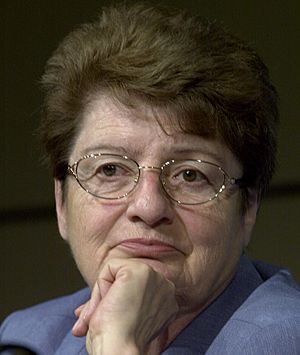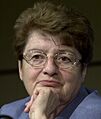Anne Osborn Krueger facts for kids
Quick facts for kids
Anne Krueger
|
|
|---|---|

Krueger in 2004
|
|
| Acting Managing Director of the International Monetary Fund |
|
| In office March 4, 2004 – June 7, 2004 |
|
| Preceded by | Horst Köhler |
| Succeeded by | Rodrigo Rato |
| First Deputy Managing Director of the International Monetary Fund | |
| In office September 1, 2001 – August 31, 2006 |
|
| Preceded by | Stanley Fischer |
| Succeeded by | John Lipsky |
| Chief Economist of the World Bank | |
| In office 1982–1986 |
|
| President | Alden W. Clausen |
| Preceded by | Hollis Chenery |
| Succeeded by | Stanley Fischer |
| Personal details | |
| Born | February 12, 1934 Endicott, New York, U.S. |
| Education | Oberlin College (BA) University of Wisconsin–Madison (PhD) |
| Academic career | |
| Institutions | Johns Hopkins University Stanford University Duke University University of Minnesota |
| Doctoral advisor |
James Earley |
| Doctoral students |
Zvi Eckstein |
Anne Osborn Krueger (born February 12, 1934) is an important American economist. An economist studies how people and countries make, use, and share money and resources.
She held several big jobs in global finance. From 1982 to 1986, she was the World Bank Chief Economist. She also served as the first deputy managing director of the International Monetary Fund (IMF) from 2001 to 2006. Today, she is a senior research professor at the Johns Hopkins School of Advanced International Studies.
Contents
Early Life and Education
Anne Krueger was born in Endicott, New York, on February 12, 1934. Her father was a doctor. She went to Oberlin College and earned her first degree in 1953.
Later, she continued her studies in economics. She received her Master's degree and her Ph.D. (a very high-level degree) from the University of Wisconsin–Madison. She finished these degrees in 1956 and 1958.
What an Economist Does
As an economist, Anne Krueger is well-known for her work on how countries trade with each other. She also studied how governments make rules that affect the economy. She even came up with a special term called "rent-seeking" in 1974.
She has often spoken out against government help for the U.S. sugar industry. She has written many articles about how to improve policies in developing countries. She also writes about how big international groups help the world economy.
Her Career Journey
Anne Krueger started her teaching career at the University of Wisconsin in 1955. She became an economics professor there in 1958. From 1959 to 1982, she taught economics at the University of Minnesota.
Working at the World Bank
From 1982 to 1986, she was the World Bank Chief Economist. The World Bank is a big organization that helps countries develop and reduce poverty. In this role, she was also the Vice President of Economics and Research. During her time, the World Bank did large studies to understand how trade affects many different countries.
Teaching and Research
After leaving the World Bank, she taught at Duke University from 1987 to 1993. Then, she joined Stanford University as a professor until 2001. At Stanford, she also helped start a center for economic development research. She was also a senior fellow at the Hoover Institution, which is a public policy think tank.
Leading at the IMF
From September 1, 2001, to August 31, 2006, she was the First Deputy Managing Director of the International Monetary Fund (IMF). The IMF is another major international organization that works to keep the world's money system stable.
She even served as the temporary Acting Managing Director of the IMF for a few months in 2004. She was the only woman to hold such a high leadership role at the IMF until Christine Lagarde was appointed in 2011.
Awards and Current Role
In 2005, she received an honorary title from the University Philosophical Society in Dublin, Ireland. In 2010, her old college, Oberlin College, gave her an honorary doctorate degree. Since 2007, she has been a professor of international economics at the Johns Hopkins School of Advanced International Studies.
She is also a respected member and past president of the American Economic Association. She belongs to several important groups like the United States National Academy of Sciences. She has received many awards for her work in economics.
Struggling with Success
In her 2012 book, Struggling with Success: Challenges Facing the International Economy, Anne Krueger talks about globalization. Globalization means how countries and people around the world become more connected through trade and communication.
She explains that globalization has grown quickly since the 1800s. During this time, countries that became more connected also saw a big improvement in the lives of their people, especially in poorer nations.
Krueger's book mainly focuses on why some Asian countries grew so fast. She also looks at how government rules changed after World War II. She argues that when governments reduced some of these rules, it helped the world economy grow even more.
She believes it's important to remove things that stop trade between countries. These are called "trade barriers." She also thinks countries should reduce rules that make it harder for businesses to operate. This is called "deregulation." She says that tools like "producer subsidy equivalent" helped remove barriers in farming. These tools gave politicians clear information to make better decisions.
Krueger explains that too many rules can hurt a country's economy. They can also affect other countries that trade with it. For example, she mentions how some U.S. taxes and rules caused businesses to move their money or offices to other countries. She concludes that open trade leads to great economic growth. This growth also showed the importance of supply-side economics, which focuses on how making it easier for businesses to produce goods helps the economy.
Understanding Rent-Seeking
In 1974, Anne Krueger wrote an important article called "The Political Economy of the Rent-Seeking Society." In this article, she made the term rent-seeking very popular.
Rent-seeking happens when special interest groups try to get favors from the government. These favors can be things like special taxes on imports (tariffs), patents, or government help (subsidies). They can also be limits on how much can be imported (import quotas) or other market rules.
Krueger says that rent-seeking is not efficient. It means people are trying to get a bigger piece of the existing economic pie, instead of working to make the pie bigger for everyone. It doesn't create new wealth.
She also explains that when there are import restrictions, it not only costs money like a regular tax, but it also creates an extra cost because of rent-seeking behavior. She believes that rent-seeking can lead to more rent-seeking. This happens because in markets where rent-seeking is common, new businesses might feel they have to spend their money on getting government favors instead of on developing new technologies or products.
In 2011, the American Economics Association recognized Krueger's article as one of the twenty best articles published in the first 100 years of the American Economic Review.
Images for kids
See also
 In Spanish: Anne Osborn Krueger para niños
In Spanish: Anne Osborn Krueger para niños
 | Isaac Myers |
 | D. Hamilton Jackson |
 | A. Philip Randolph |


